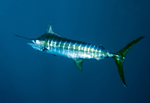Deep Sea Fishing is ‘Unsustainable’; Efforts Should Concentrate on ‘Productive Local Waters’
By FIS/MP
MercoPress
A team of marine scientists is urging an end to most commercial fishing in the deep sea and instead recommending fishing in more productive and local waters. In their analysis published online in the journal ‘Marine Policy’, the team shows that all deep-sea fisheries are unsustainable.
Funded mainly by the Lenfest Ocean Program, the “Sustainability of deep-sea fisheries” study shortly precedes the United Nations meeting where it will be decided whether to continue allowing deep-sea fishing in the high seas.
The scientists explain that deep underwater, food is scarce and life processes happen much slower than near the sea surface.
“The deep sea is the world’s worst place to catch fish”
elaborated marine ecologist Dr Elliott Norse, the study’s lead author and president of the Marine Conservation Institute in Bellevue, Washington, US.
“Deep-sea fishes are especially vulnerable because they can’t repopulate quickly after being over-fished.”
Dr Selina Heppell, a marine fisheries ecologist at Oregon State University, noted that it is impossible to control or even keep track of the amount of fishing occurring in the high seas.
“The effects on local populations can be devastating,” she said.
The authors describe the collapse of many deep-sea species worldwide, including sharks and orange roughy.
“Fifty years ago no one ate orange roughy”
noted author Dr Daniel Pauly, a fisheries biologist with the University of British Columbia (UBC).
“In fact, it used to be called slime-head, indicating no one ever thought we would eat it”.
It has been found out that the species takes 30 years to reach sexual maturity and can live 125 years.
Author Dr Malcolm Clark, a New Zealand-based fisheries biologist, explained that fishing for orange roughy started in NZ and expanded quickly through the 1980s and 1990s. The trend continued in Australia, Namibia, the SW Indian Ocean, Chile and Ireland.
“However, most of the fisheries were overexploited, and catch levels have either been dramatically reduced or the fisheries closed all together,” he said.
“It demonstrates how vulnerable deep-sea fish species can be to over-fishing and potential stock collapse.”
Very few exceptions to unsustainable deep-sea fisheries exist.
“Deep-sea fisheries can be sustainable only where the fish population grows quickly and fisheries are small-scale and use gear that don’t destroy fish habitat,” said Norse.
“With slow-growing fish, there’s economic incentive to kill them all and reinvest the money elsewhere to get a higher return-on-investment”.
The lawlessness of the high seas and nations’ fisheries subsidies exacerbate over-fishing in the deep sea.
High seas trawlers get about USD 162 million yearly in government handouts, or 25% the value of the fleet’s catch, reported Dr Rashid Sumaila, an author and fisheries economist at UBC.
The authors advise ending economically wasteful deep-sea fisheries, redirecting subsidies toward displaced fishers and replenishing fish stocks in productive waters closer to ports and consumers, which are places much more conducive to sustainable fisheries.
Source: MercoPress








Comments
Deep Sea Fishing is ‘Unsustainable’; Efforts Should Concentrate on ‘Productive Local Waters’ — No Comments